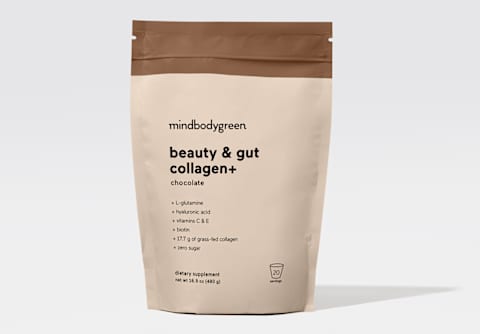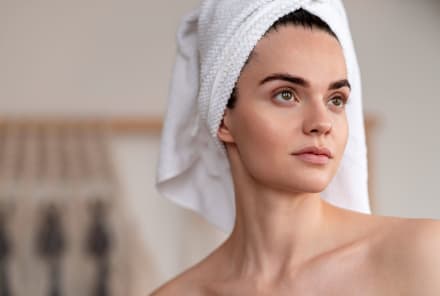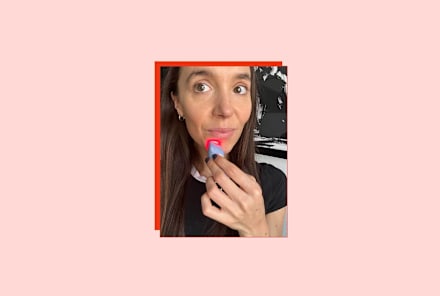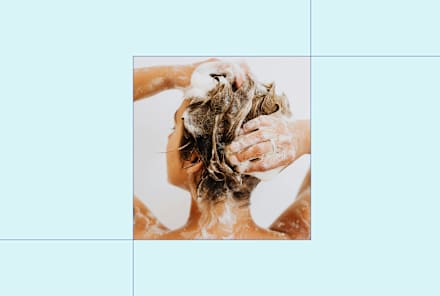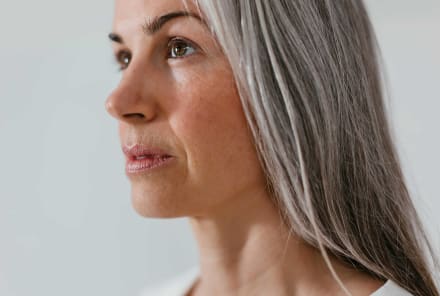Advertisement
A Holistic Plastic Surgeon Shares 3 Things To Know About Collagen Supplements


"Your body has regenerative abilities to literally rejuvenate itself. You just have to give it the tools to do so," says holistic plastic surgeon Anthony Youn, M.D., on the mindbodygreen podcast. One of those tools is proper nutrition—plus supplements when you need a bit of extra help.*
Youn is considered one of the nation's best-known experts in looking younger (with or without surgery), so to no surprise, he’s a big fan of collagen powders. "Collagen is what makes the skin nice and firm, tight and youthful," he reminds us, but it starts to decline once you hit your mid-20s.
Collagen supplements have been shown to promote your body's natural collagen production—but there are some caveats Youn wants to call out:*
Look for hydrolyzed
First things first: You'll want to look for hydrolyzed collagen peptides, Youn shares.
You see, we all have natural collagen in our bodies, but collagen supplements come from animals—sourced from cow hides or fish scales—and the molecules are quite large, so they need to be broken down first so our bodies can use them. This version is called hydrolyzed collagen (or simply collagen peptides), created through a process called hydrolysis, where water molecules rupture the chemical bonds.
"So, companies that have high-quality collagen will break that collagen down into individual amino acids or groups of peptides, and that allows the body to absorb it more readily," notes Youn. If it's not hydrolyzed, it's not useful!
Mind the type
"The other important thing with collagen supplements you need to keep in mind is that there are five different types of collagen," says Youn. "Three of them are the most important: Type I collagen is in your hair, your skin, your nails, and your bones; type II collagen is in your joints; type III is in your muscle; type IV and V aren't as important (IV is in your kidneys and V is in your placenta)."
For the purposes of skin health, types I and III are the most relevant. Type I collagen is the most common in the body, and it provides structure to skin, tendons, bones, ligaments, and other connective tissues. Type III collagen works alongside type I in skin, ligaments, blood vessels, and joints too, and we know that it is very important for fibroblast function1.*
So, "if you're taking a collagen that's, say, type II, that's not going to help your hair, skin, and nails at all," says Youn. Make sure your label clearly states what type of collagen it has, as each plays a different role.
mindbodygreen's beauty & gut collagen+, for example, contains types I and III hydrolyzed collagen peptides to really focus on strong, glowing skin.* Not to mention, it has seven extra nutrients, botanicals, and bioactives to further nourish skin health, like hyaluronic acid, vitamins C and E, biotin, and curcumin from turmeric extract.*
Regardless, get enough protein
The peptides in collagen powders are made up of amino acids, the building blocks of all proteins. Still, general protein intake is important, as it supplies your body with the nine essential amino acids it needs to function and thrive.
"Really getting enough protein [is important], because collagen, once again, is a large protein," Youn says. "[Protein] is so, so important to keeping our collagen nice and firm and youthful."
The Recommended Dietary Allowance (RDA) of protein is 0.8 grams per kilogram of body weight2 per day, but this number is the minimum amount of protein a sedentary person needs to meet their nutritional requirements; most experts we regularly work with suggest aiming for a goal of around 100 grams of protein per day.
Collagen powder and protein powder, while they both include amino acids, are not interchangeable—though they do come with their own list of benefits.* So why not add both to your routine? Here, browse our favorite collagen powders and protein powders.
The takeaway
Collagen: It's the family of proteins we all know and love for firm, youthful skin. Youn agrees, which is why he recommends taking collagen supplements daily to secure a smoother, more hydrated skin appearance.* As long as you're aware of the common red flags (namely, non-hydrolyzed and the wrong type), you should see results with time—here's how long a quality powder takes to work.
Watch Next
Enjoy some of our favorite clips from classes
Enjoy some of our favorite clips from classes
What Is Meditation?
Mindfulness/Spirituality | Light Watkins
Box Breathing
Mindfulness/Spirituality | Gwen Dittmar
What Breathwork Can Address
Mindfulness/Spirituality | Gwen Dittmar
The 8 Limbs of Yoga - What is Asana?
Yoga | Caley Alyssa
Two Standing Postures to Open Up Tight Hips
Yoga | Caley Alyssa
How Plants Can Optimize Athletic Performance
Nutrition | Rich Roll
What to Eat Before a Workout
Nutrition | Rich Roll
How Ayurveda Helps Us Navigate Modern Life
Nutrition | Sahara Rose
Messages About Love & Relationships
Love & Relationships | Esther Perel
Love Languages
Love & Relationships | Esther Perel
What Is Meditation?
Box Breathing
What Breathwork Can Address
The 8 Limbs of Yoga - What is Asana?
Two Standing Postures to Open Up Tight Hips
How Plants Can Optimize Athletic Performance
What to Eat Before a Workout
How Ayurveda Helps Us Navigate Modern Life
Messages About Love & Relationships
Love Languages
Advertisement
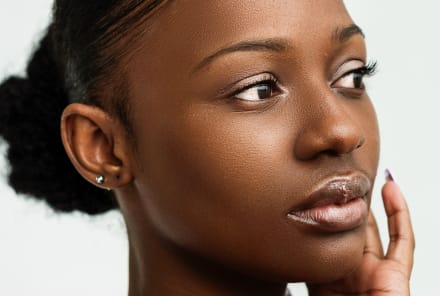
We Need To Talk About Toxic Femininity In Beauty: Ever Encounter These Examples?
Perpetua Neo, DClinPsy

We Need To Talk About Toxic Femininity In Beauty: Ever Encounter These Examples?
Perpetua Neo, DClinPsy

We Need To Talk About Toxic Femininity In Beauty: Ever Encounter These Examples?
Perpetua Neo, DClinPsy

We Need To Talk About Toxic Femininity In Beauty: Ever Encounter These Examples?
Perpetua Neo, DClinPsy
